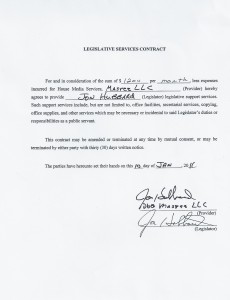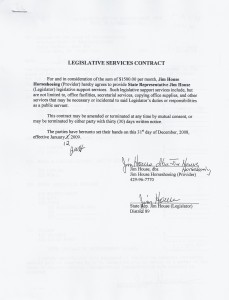 More fun with invoices coming later today, but, first, three tangentially related thoughts on reimbursements under the statute:
More fun with invoices coming later today, but, first, three tangentially related thoughts on reimbursements under the statute:
1. The most common response I’ve heard since starting these posts is that some legislators simply cannot afford to do the job without the extra income. That misses the point entirely; whether legislators should (or must) be paid more has nothing to do with whether the money they are taking home RIGHT NOW is legally taken. Those are two wholly different questions, and their answers have absolutely, positively nothing to do with one another.
Heck, it’s entirely possible that I would agree with someone who said that being a legislator these days has gone from a three-month-per-two-years job to a year-’round gig. Between the internet making it easier to locate and contact your Rep/Sen and the 24/7 political-news culture making everyone feel like his or her problem is important enough to call said lawmakers, I’d imagine that it is much closer to a 24-month job than a three-month job. On the basis of that, I could see increasing the pay. Whatever.
That said, arguments of whether lawmakers can afford not to take an unconstitutional extra salary right now necessarily gloss over that the extra salary is not theirs to take. Look at it this way: if I take a job at some random company, and I agree to a set salary, it’s not up to me to decide whether I want to go ahead and steal $500 from petty cash every week simply because I think my salary is not high enough for the job I’m being asked to do.
And maybe that is the larger point — if you sought this job, knowing full well what the statutory salary is, then (a) suck it up and take only the salary you are supposed to get, plus any legitimate, documented reimbursements, or (b) just go ahead and admit that you knew ahead of time about the extra “reimbursement” money that was available. Those are, quite literally, the only two legitimate positions you can take at this point.
Sorry that you don’t like the salary, but grow a pair and vote yourself a pay raise if you want more; don’t try to backdoor it through fake “reimbursements” that cover costs you’ve not actually incurred.
2. It hit me when I was writing the post yesterday about this stuff that there’s no reason the legislators who live within 50 miles of the Capitol should be “paying” an additional $850/month to the provider of legislative services (or to the landlord, or to their spouses, or whatever). The extra $10,200 under A.C.A. § 10-2-212 (d)(1) is for lawmakers who “elect not to receive per diem and mileage payments for attending legislative sessions and for attending legislative activities and in lieu thereof be reimbursed” up to the maximum amount.
Ignore for a moment pesky tidbits like “this is still a reimbursement, so it should be documented under Amendment 70 if not under basic common sense” and “it is insane to give legislators extra money ‘in lieu of’ documented mileage when they are not driving anywhere near the mileage that would make this total make sense.” This “reimbursement” is specifically targeted for the legislator to keep, as it replaces the mileage and per diem checks that other legislators get. No one would seriously suggest that a legislator from, say, Fort Smith could “contract” for legislative services in an amount that included what he expected to rack up in mileage each month. Yet all of them who receive the in-lieu-of amount do just that and include it as part of their “My Wife, LLC, contracts with me to provide services for $2050/month.”
Why does this matter? Well, for two reasons, I suppose. First, to the extent that someone is legitimately contracting with a third party and the money is going to the third party, contracting for an amount above the statutory maximum under A.C.A. § 10-2-212 (c) is problematic at best. Alternatively, to the extent that the contracts and the services are all just a cover for extra income that is flowing back to the legislator, the inclusion of the in-lieu-of amount just makes the scheme all the more transparent, and the fact that the money is paid when a contract and invoice improperly lump the two amounts together shows just how little record-keeping and accountability there really is in this system.
3. In the previous paragraph, I referred to contracts four times. In reality, however, many of the agreements under which the “legislative services” are (theoretically) provided are not actually contracts. At least not in the legally binding sense that most people would use that word.
You see, there are a handful of legislators who, for whatever reason (lazy? uninformed? hubris?), do not create any sort of legally separate business entity (LLC, Corporation), nor do they have their spouse create one. Instead, these lawmakers simply refer to themselves as “dba ________.” This results in the person “providing” the services and the person “receiving” the services being one in the same.
Pretending for a moment that it’s not borderline insane to suggest that these people are providing services to themselves — didn’t grandma say they’d go blind? — it’s still pretty ridiculous to suggest that a person could sign a contract with himself. In addition to an offer and acceptance, a contract needs at least two legally distinct (if not physically distinct) parties involved. When there are not two parties, there is not a contract. Yet the payments are made every month to these legislators, despite the lack of any binding agreement. See, for example, Rep. John Burris (R-85, Harrison);
 Rep. Jon Hubbard (R-75, Jonesboro);
Rep. Jon Hubbard (R-75, Jonesboro);
and former Rep. Jim House (D-89, Fayetteville);
These are not the only non-contracts being paid; from my previous post alone, you could include former Rep. Barbara Nix (D-28, Benton), Rep. Ann Clemmer (R-29, Benton), and the list only grows from there. Off the top of my head, I’d wager that roughly 1/4th of the agreements are technically not valid contracts. Though, when you are getting paid regardless, who cares if it’s a valid agreement, right?
The kicker to this is that it would be a contract, at least in the legal sense, if the legislators in question merely had their spouses sign instead of signing both parts themselves. Oh, sure, it would look a little odd to have your wife basically billing you for working out of your house, but no more odd than some of the other arrangements we’ve seen so far.

